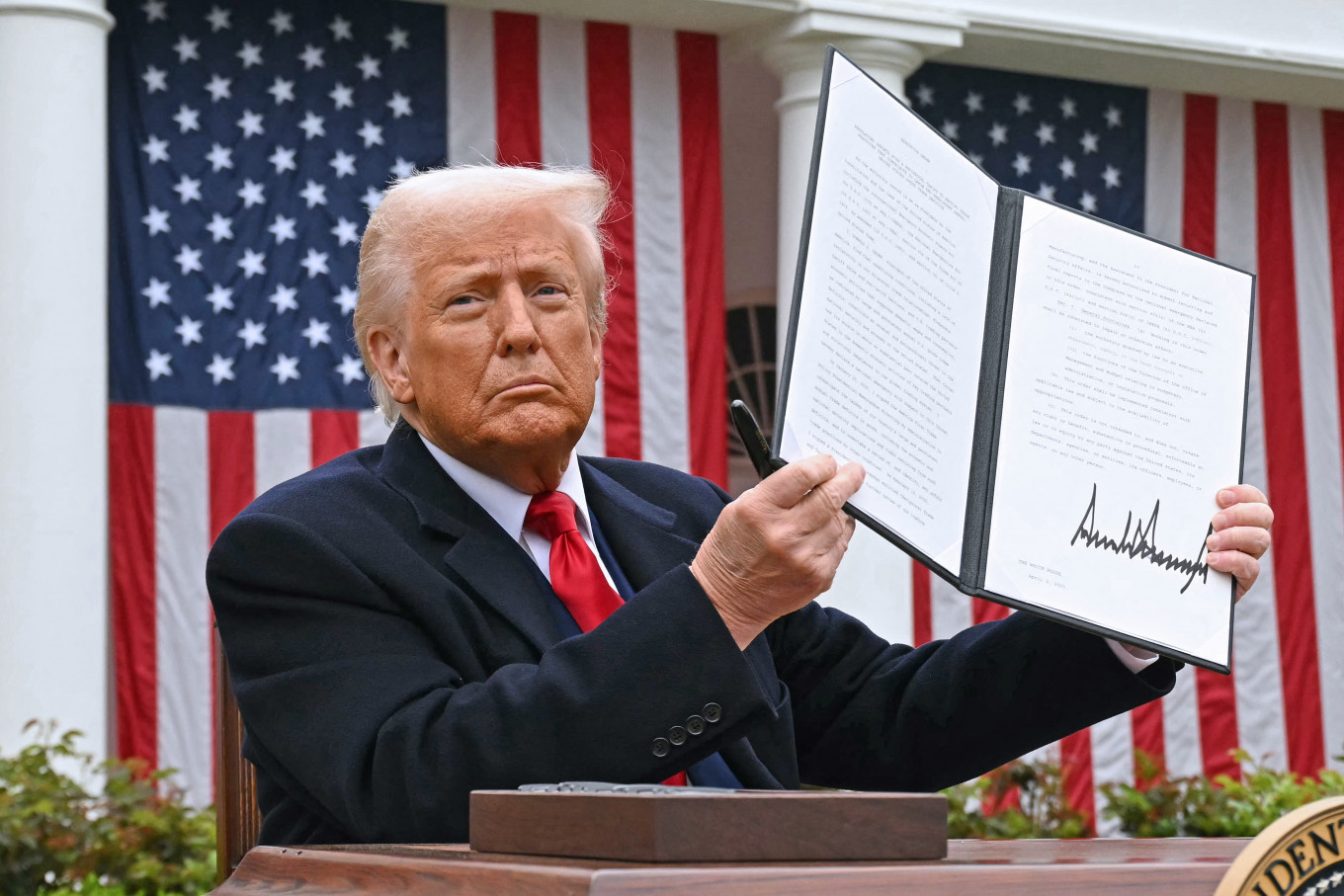Popular Reads
Top Results
Can't find what you're looking for?
View all search resultsPopular Reads
Top Results
Can't find what you're looking for?
View all search resultsUS trade court blocks tariffs in major setback for Trump
Change text size
Gift Premium Articles
to Anyone
A
US federal court on Wednesday blocked most of Donald Trump's sweeping import tariffs from going into effect, ruling that the president had overstepped his authority with the across-the-board global levies.
The opinion marks a significant setback to the Republican leader as he bids to redraw the US trading relationship with the world by forcing governments to the negotiating table through tough new levies.
Trump's global trade war has roiled financial markets with a stop-start rollout of levies that are aimed at punishing economies that sell more to the United States than they buy.
But the three-judge Court of International Trade effectively called a ceasfire, barring most of the restrictions that the president has announced since taking office.
The White House slammed the ruling, arguing that "unelected judges" have no right to weigh in on Trump's actions to address what the administration frames as a "national emergency."
"President Trump pledged to put America first, and the administration is committed to using every lever of executive power to address this crisis and restore American greatness," said Trump's spokesman Kush Desai.
The statement did not mention any legal challenge, although multiple US outlets said the Trump administration had already filed an appeal.
One of Trump's closest White House aides, Stephen Miller, was less diplomatic as he took to social media to decry a "judicial coup" that he said was "out of control."
Trump unveiled sweeping tariffs on most trading partners on April 2, with a baseline 10 percent, plus steeper duties on dozens of economies, including China and the European Union.
The ruling also quashes duties that Trump imposed on Canada, Mexico and China separately using emergency powers.
Markets were thrown into turmoil but calmed after he paused the larger tariffs for 90 days. He also suspended some of the higher duties pending negotiations with individual countries and blocs.
- 'Unconstitutional' -
The federal trade court was ruling in two separate cases -- brought by businesses and a coalition of state governments -- arguing that the president's actions violated the power of purse given to Congress under the constitution.
"The question in the two cases before the court is whether the International Emergency Economic Powers Act of 1977 ("IEEPA") delegates these powers to the president in the form of authority to impose unlimited tariffs on goods from nearly every country in the world," the three-judge panel wrote in an unsigned opinion.
"The court does not read IEEPA to confer such unbounded authority and sets aside the challenged tariffs imposed thereunder."
The court, which adjudicates civil cases arising from trade disputes, said that any interpretation of the IEEPA that "delegates unlimited tariff authority is unconstitutional," according to court documents.
- 'Extraordinary threat' -
The IEEPA authorizes the president to impose necessary economic sanctions during an emergency "to combat an unusual and extraordinary threat," the bench said.
Trump cited the IEEPA when he said trade deficits and the threat posed by the ingress of drugs into the United States justified widespread tariffs.
The decision revoking that move gave the White House 10 days to complete the bureaucratic process of halting the tariffs, although the administration is almost certain to appeal.
The Justice Department has defended Trump's trade strategy in court, insisting that the judiciary has very limited authority over his actions and sparking criticism that the White House was attempting to usurp the power of the other branches of government.
Trump has claimed that Americans will reap the benefits of his "America First" trade posture, pointing to early successes in deals struck with Britain and with China, the world's second-largest economy.
US Treasury Secretary Scott Bessent told Bloomberg Television on Friday the lower 10 percent tariff rate was "contingent on countries or trading blocs coming and negotiating in good faith."
But Trump sent markets into a tailspin by threatening to hit EU goods with a 50 percent tariff from June 1, saying talks were "going nowhere" as negotiations with the powerful trade bloc failed to yield progress.
Brussels recently threatened to hit US goods worth nearly 100 billion euros (US$113 billion) with tariffs.
Wall Street shares briefly bounced on Tuesday after Trump delayed the levies over the long holiday weekend -- although markets were down again Wednesday.
Analysts also warn that the cost of the tariffs will likely be passed on to US consumers, raising inflation and potentially leading the US central bank to hold interest rates higher for longer, further impacting financial markets.
Gregory W. Meeks, the top Democrat on the House Foreign Affairs Committee, said the ruling confirmed what had long been known -- that "these tariffs are an illegal abuse of executive power."











